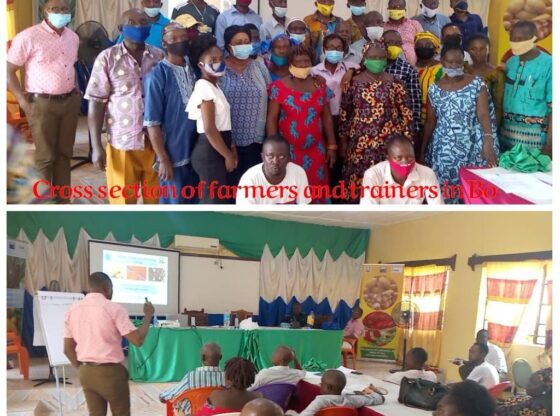SLeCAD, SCADeP Educate Farmers
By Alhaji Haruna Sani
The Sierra Leone Chamber of Agribusiness Development (SLeCAD),in partnership with Smallholder Commercialization and Agribusiness Development Project (SCADEP) and the Standards Bureau, have organized a two-day training on Marketing, Packaging, and Branding of Small and Medium Businesses (SMEs) for farmers in Bo and Kenema
The training in Bo was organized at the BO Agricultural Compound on Thursday, March 25th 2021 with the theme: ‘Strengthening SMEs Capacity in Marketing and Standards.’
The main objective of the training was to build the marketing, product development, packaging, labelling, branding and standards development capacities of SCADeP and SLeCAD supported agribusinesses, SMEs and Out growers to be able to competitive edge in the market and run profitable and successful business
Trainers included officials from the Sierra Leone Standard Bureau, SLeCAD, SCaDEP, and the Ministry of Agriculture, while the trainees include farmers in agribusiness of different sectors including pice production, poultry, palm oil, cashew, soya beans, gari, sorghum and more in all districts of the two regions.
Giving an overview of the SLeCAD, Executive Secretary of SLeCAD,Ahmed Aki Nanoh, explained that the aforementioned project has been executed in Sierra Leone under the Ministry of Agriculture in consultation with USAID ,World Bank, and Giz since 2008.
He mentioned that the purpose of SLeCAD is to work with the ministry of agriculture to prepare farmers in the private sector to follow standard compliance so that their agricultural products will thrive in the market and farmers will go to full scale industrialization.
According to him, the activities of SLeCDA will help form a formidable private sector that will make the work of the ministry visible, and, by extension, positively impact on the economy of the country, by saving the 250 million United States Dollars spent for the annual importation of rice alone, adding that if 50 million Dollars is given to each region, the country will be saved from food insecurity.
The Executive Secretary said SLeCAD is working with the World Trade Organization (WTO), and International Finance Cooperation (IFC), to develop a business plan that will take Sierra Leone SMEs product internationally and help bridge the gap of food insecurity and poverty.
He noted that the role of the Ministry of Agriculture is to support with policies and technical know-how, that will be transferred to the private sector which will in turn help create jobs, reduce poverty and to make life better for all.
He said that cannot be achieved without obtaining standard compliances like packaging, branding, labelling and farmers acquiring skills and knowledge to attract loan providers.
In his statement, SCaDEP representative southern region, and Team Lead for Value Chain Promotion Officers, Francis Sam Gbeinga, thanked SLeCAD for organizing such all important program, noting that SCADeP is a sister project to SLeCAD, and that the former seeks to promote agricultural productivity through improved access to markets, finance and development of inclusive smallholder farmer agribusiness linkages in targeted project areas of Sierra Leone.
He noted that if local farmers engage in large scale farming and quality productivity it will help augment agricultural growth required to reduce extreme levels of poverty among smallholder farmers and promote nationwide growth.
He encouraged the farmers to engage in the production of high standard quality that would be a useful addition to the market.
Manager of Standards Department of the Sierra Leone Standards Bureau, Abdul Aziz Kamara, encouraged the Agribusiness Farmers to adhere to standards, adding that branding, packaging, and labelling are all requirements of standards.
He described standards as a norm and a way of life and admonished farmers to make sure they take their product to Standards Bureau to conduct measurement, fix expiring date, lab test and more. He said failing to follow those processes will amount to a crime and product of such cannot be put to market for sales or exported.
Aiah J. Thorlie, Director of Agricultural Extension in the Ministry of Agriculture, told the farmers that the only avenue left for government to supporting farmers is through the private sector, noting that by the next farming season, the private sector will be providing seedlings, fertilizers and machines for agribusiness farmers.
He commended SLeCDA for organizing such a useful training, adding that the aforementioned is a body that is responsible for information flow, giving technical advice, and capacitating processors and producers of farm #products, making it the body that will be directly interfacing with the farmers.
At the end of the training, agribusiness farmers expressed gratitude to SLeCDA and its partners for the wonderful capacity building training and promise to strictly put in practice what they have been thought within the two days.


